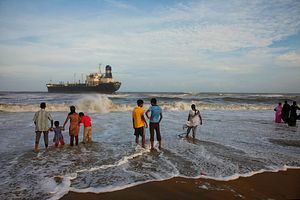From late in the evening of December 12 2016, Cyclone Vardah approached the state of Tamil Nadu in South India with predictions of severe landfall in the areas of Chennai, Tiruvallur and Kanchipuram in particular. The city of Chennai, which was the prime site of flooding and devastation last December was on the alert for the wreckage that would follow, but is only beginning to get back on its feet in over the week that has passed since.
Early on, rail and air services were temporarily suspended and schools, colleges and several workplaces declared a holiday. Fishermen were asked not to venture out to sea for at least 48 hours given predictions of wind gusts and choppy waters. Chief Minister O Panneerselvam requested armed forces to be on standby, asked people to ration food and convened a meeting of the state’s Disaster Management Authority as well. 15 National Disaster Response Force (NDRF) teams were deployed across strategic coastal regions in the states of Tamil Nadu and Andhra Pradesh.
While by the night of December 13, forces declared that the worst was over for the city of Chennai and its closest coastal regions, the days since have been evidence of the destruction it left in its wake. As of the morning of December 14, over 13,000 people had already been moved to relief centers in Chennai, Tiruvallur and Kanchipuram, in addition to those that had been evacuated in coastal regions prior to the storm. Fallen trees, clogged roads, flooding in low lying areas and a complete jam of electricity and mobile connectivity ensured that the city was on lockdown in the days that followed.
While the authorities began clearing trees and unclogging roads immediately after the clear signal had been given, this only allowed some sense of normalcy for citizens. The power lines needed the better part of the week to be set up once more and broadband connectivity has still not fully been restored to parts of Chennai. What made this situation worse was the severe cash crunch that accompanied it.
Prime Minister Narendra Modi’s move to demonetize high value currency early last month has had a severe impact on all informal and a significant number of formal transactions in the country, that were dependent on cash. The makeshift as well as established forms of digital connectivity were among the few routes available for everyday transactions when the number of 100 rupee notes proved inadequate, and ATMs were slow to replenish.
When Chennai went off the grid, this situation escalated. With both businesses and common people having no access to internet in any form, the cash crunch hit harder even in terms of food and transportation. Relief workers also reported a difficulty in accessing rations. Hospitals were particularly helpless in this regard as even essential services could not process online transactions.
Across Chennai, Tiruvallur and Kanchipuram, over 9,000 trees and 10,000 electric poles were estimated to have been damaged, and the estimation of the full extent of devastation in particularly tree filled regions has still not been completed. To the extent that water supplies were dependent on electricity, regions faced severe shortage on that count as well. The assessment of the loss of crops is still underway, signaling bad news for farmers already ridden with debt, recovering from the floods of the previous year and reeling under demonetization.
Aside from recovery of communication networks, the government in Tamil Nadu has been fairly prompt and more prepared in getting the worst affected regions back on their feet. Recovery for individual stakeholders and disproportionately affected groups like farmers may however take its time. Chief Minister O Panneerselvam has requested an immediate assistance package of about $150 million, and submitted a memorandum asking for assistance of about $3 billion for long term recovery.

































